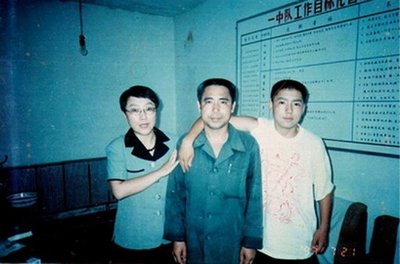 |
|
Ethnic Mongol dissident HadaThis undated handout photo released by Free-Hada-Now.org shows ethnic Mongol dissident Hada (C) posing with his wife (L) and his son at an office in Inner Mongolia. Chinese authorities are blocking family from visiting Hada who is due to be released next month after 15 years in prison.(AFP/Free-Hada-Now.Org) |
BEIJING (AFP) – Chinese authorities are blocking family from visiting an ethnic Mongol dissident due to be released next month after 15 years in prison and harassing his supporters, his wife said Friday.
Hada, the most prominent dissident from China's six-million-strong ethnic Mongolian minority, will complete a prison sentence for espionage and separatism charges on December 10, said his wife and fellow activist, Xinna.
But prison authorities in China's Inner Mongolia region are preventing her and other family members from visiting, said Xinna, who has not been allowed to see her husband since April.
Prison officials in the city of Chifeng where he is jailed say she cannot visit because communications apparatus used by prisoners to talk with visitors is broken, she told AFP by phone from the regional capital Hohhot.
"I ask them when they will fix it and they say they don't know. This is very abnormal," said Xinna, who -- like many ethnic Mongols -- goes by one name.
AFP calls to the prison went unanswered.
One of China's longest-jailed prisoners of conscience, Hada, now 54, fell foul of China's government in the 1990s after organising demonstrations for Mongol rights as head of the underground Southern Mongolian Democracy Alliance.
His release will mark a milestone for the ethnic Mongol dissident community.
Many Mongols, who have more of a cultural and ethnic affinity with the republic of Mongolia to the north, complain of political and cultural repression by China.
Xinna said that she expected Hada, a former philosophy and political theory researcher and editor, will be freed on schedule and resume his "intellectual" activities, but she is unsure how much control he will face.
His sentence included a ban on involvement in politics for four years after his release.
Hada has endured torture, beatings by inmates from China's main Han ethnic group, and denial of proper food and medical treatment for serious illnesses, she said.
Authorities also are harassing Govruud Huuchinhuu, an ethnic Mongolian dissident writer, after she tried to organise a welcome for Hada on his release, Xinna said.
Huuchinhuu was detained by police in the city of Tongliao on November 11 and placed under house arrest, the Southern Mongolian Human Rights Information Centre, a Mongol exile group, said in a statement.
Press freedom group Reporters Without Borders said the actions "indicate a degree of nervousness about the prospect of (Hada's) imminent release."
Xinna said Huuchinhuu was now being allowed to leave home but is followed by police and faces other restrictions.
Hada will initially focus on recuperating from illnesses such as gall bladder disease that Xinna blames on his prison conditions, and catching up with friends.
"There are many people wanting to see him and whom he will want to see after such a long time," she said.
China has launched what rights activists call a broad crackdown on dissent following the October 8 Nobel Peace Prize for jailed dissident Liu Xiaobo.
The Nobel ceremony is the same day as Hada's release and falls on International Human Rights Day.







